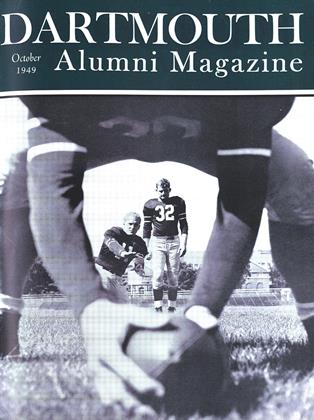Shortly after the college Settles down to the work of the new year the Dartmouth Trustees will gather in town for their annual fall meeting. The major item on their October 14 docket will be the 1949-50 budget, which unquestionably will be the biggest in the history of the College; and another important subject for discussion will be the possibility of expanding Dartmouth's scholarship program. As background for this latter problem we refer our readers to this month's lead article on financial aid, written by Bob Allen '45, recently appointed to the administrative staff as assistant in fundraising.
A highly desirable but costly increase in this year's budget has been brought about by the improved retirement plan for faculty and administrative officers that goes into effect October 1. This revised plan, whereby the College matches up to 8% of the officer's salary each month in an annuity fund, combines with the previously announced retirement and groupinsurance program for the entire non-academic staff to put Dartmouth in the very forefront of colleges and universities providing security for their employees. The College also shares, . with faculty and. administrative officers the cost of their new group-insurance program, providing a doubled maximum of $100,000 for each full-time member; bears the entire cost of group insurance for the non-academic staff; and pays the greater portion of the cost of the non-academic retirement plan. In all, this security program which President Dickey and the Trustees have made a reality will add more than S1OO,OOO to the annual budget.
In tackling the question of finances for the current year, the Trustees and John F. Meek '33, now fully at the helm as Treasurer of the College, have the cheering knowledge that the $386,000 contributed by a record-breaking number of Dartmouth men in the 1949 Alumni Fund campaign enabled the College to balance its 1948-49 books and start off the present year without any hampering deficit. In whatever decisions they make at the October 14 meeting of the Board they will again lean heavily upon the stability of the Alumni Fund, which during the past two years has put strong emphasis on participation, with extremely encouraging results. On the income side, the College will also have the benefit, starting this fall, of the $75 "added fee toward the cost of education," which is to be remitted in the case of all scholarship men. The new fee has been added to the annual tuition charge of $600.
President Dickey, when he announced the added fee last spring, stated that "the establishment of an 'added fee toward the cost of education' is in accord with the basic principle of having those who can, bear a larger portion of the cost to the College of their education. Increased and increasing operating expenses are such that the tuition and the added fee together will cover only slightly more than one-half of the cost to the College of each man's education at Dartmouth." This first step by Dartmouth has marked out a new line of solution and has pro- vided food for thought among the other privately endowed colleges. The YaleAlumni Magazine, in its July issue, com- mented upon the new Dartmouth fee at some length and, while describing it as "a very practical step," expressed the hope that Yale could accomplish the same result by encouraging those who can "to contribute voluntarily more than $75 additional toward the cost of their education."
 View Full Issue
View Full Issue
More From This Issue
-
 Article
ArticleThe President Comments On the Cirrotta Tragedy
October 1949 By /S/ John S. Dickey -
 Sports
SportsFOOTBALL—1949
October 1949 By Francis E. Merrill '26 -
 Article
ArticleDartmouth Seeks Growth of Its Scholarship Funds
October 1949 By ROBERT L. ALLEN '45 -
 Class Notes
Class Notes1918
October 1949 By ERNEST H. EARI.EY, DONALD L. BARR -
 Class Notes
Class Notes1926
October 1949 By E. PAUL VENNEMAN, HERBERT F. DARLING, ROBERT M. STOPFORD -
 Class Notes
Class Notes1923
October 1949 By TRUMAN T. METZEL, COLIN C. STEWART, 3rd, JULIUS A. RIPPEL














